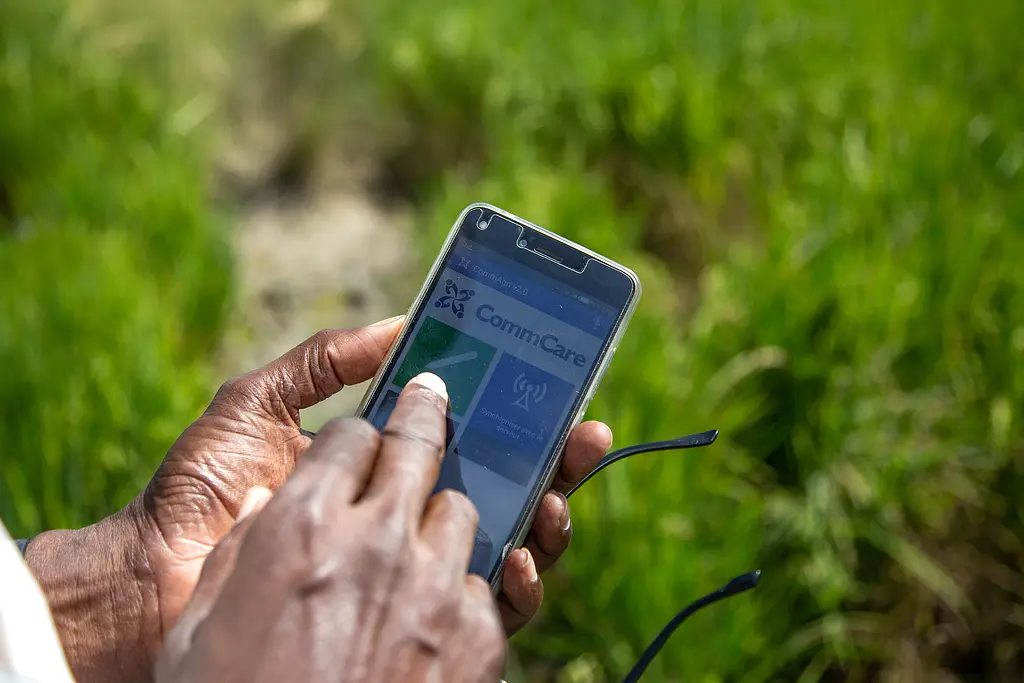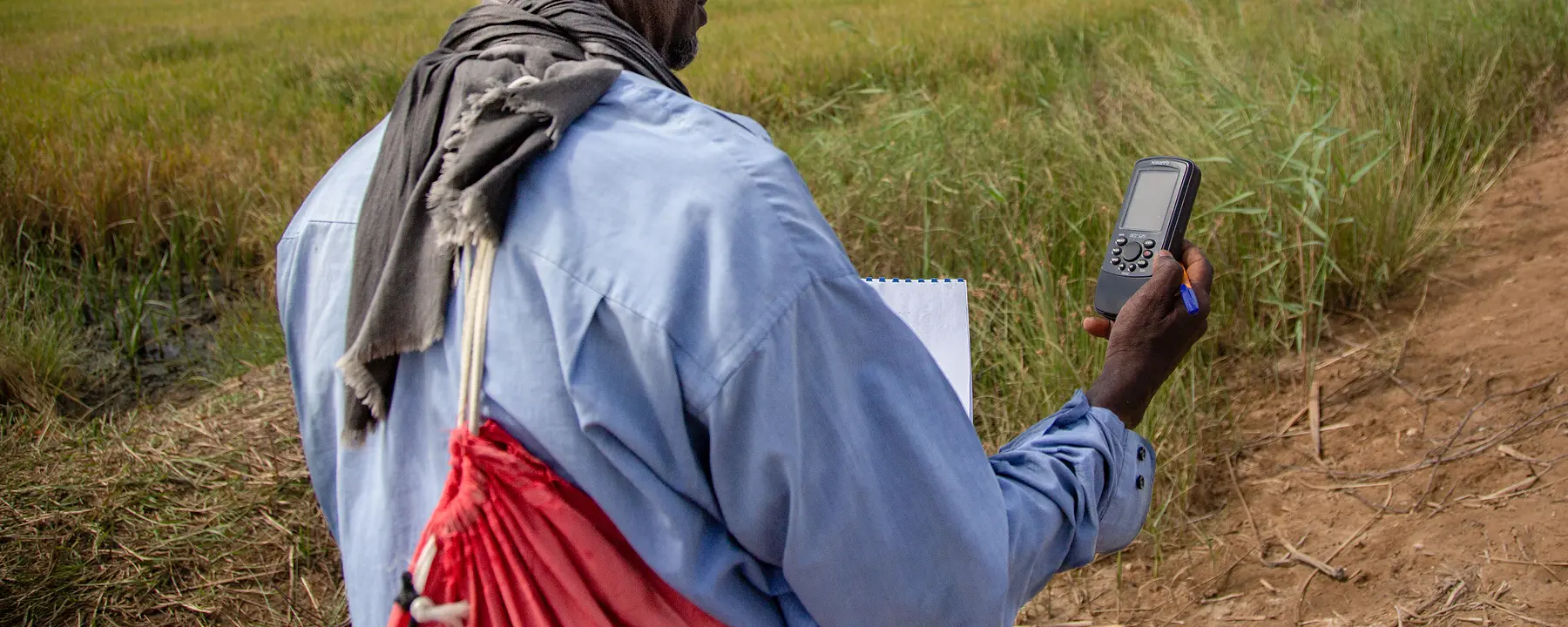A study of the effects of the COVID-19 pandemic on farmers in Senegal
To help understand how the COVID-19 pandemic affected low-and-middle-income countries, RTI conducted a series of internally funded research and development initiatives beginning in June 2020. One such research effort set out to assess how Senegalese farming families had been affected by the pandemic and how the farmer networks they belong to were responding.
Our four-month research study worked with four farmer networks in three regions of Senegal to collect information about how the agriculture sector might be shifting in response to COVID-19 and its impacts. The study identified how the farmer networks themselves are monitoring the shock and provided them with data to test their own assumptions and adapt their future strategies when responding to shocks and stresses.
Leveraging Existing Networks and Partners
From 2015–2019, RTI implemented the USAID-funded Feed the Future Senegal Naatal Mbay (“flourishing agriculture”) project, which helped more than 150,000 farmers in Senegal improve their operations and better connect with market opportunities to sell their products and increase their income.
Through the project, we developed the capability to reach up to 120,000 rural households through 123 farmer networks in the most disadvantaged regions of the country using an open-source mobile platform called CommAgri. The platform enabled networks to track their membership, seasonal production, and use of best practices and inputs, providing a foundation of data on which to base decisions for future seasons. Most of the networks’ data infrastructure remains active today despite the project ending in 2019.

Creative Data Collection during COVID-19
Because COVID-19 limited travel to and from Senegal, RTI partnered with Senegalese firm STATINFO, who uses the CommAgri platform developed under Naatal Mbay, to help coordinate COVID-safe data collection activities within Senegal.
Working through the four farmer networks, the research team used CommAgri to survey a sample of 800 agricultural households (10 percent of the networks’ collective coverage) at two points in time: first in August prior to the harvest season, then in October 2020. Survey data profiled farmer food insecurity and coping strategies, asking questions such as, “In the last 30 days, were you worried that your household might not have enough food?” and “Do you plan to change your usual farming practices to cope with the pandemic?”
To gather context and verify the survey results, while helping the farmer networks learn from one another, the research team also conducted eight virtual sessions with network leadership before, during, and after data collection.
Strong Solutions and an Optimistic Outlook
At the community level, the study found that restrictions on movement in the region created food shortages, disrupted communications, limited labor flows, and pressured farmers to use seeds they had saved for planting for household food. At the farmer level, the study found that producers in Senegal were confronting not just one, but two simultaneous shocks: the lingering impacts of low rainfall from 2019 and the new challenges caused by COVID-19. The virus arrived when the farmers were already coping with lower yields and depleted food stocks and were having difficulty repaying the previous season’s loans for farm-related inputs like seed and fertilizer.
[COVID-19] caused cascading delays that were very harmful financially to [food] producers,” said Bassirou Coly, one of the farmer network leaders. “Farmers couldn’t sell last year’s harvests, so they couldn’t pay back their loans. So they ended up in debt, with unsold crops on their hands.”
Demonstrating their resilience, farmer networks deployed a coordinated response that provided humanitarian food aid, access to personal protective equipment (PPE), seed distribution for horticulture and maize crops that could be produced more quickly and easily than rice and protected their stock of quality staple cereal seeds. The farmer networks also worked with banks to reschedule unpaid loans and created new arrangements so that their members could still access financial resources.
[Our farmer network] got quality horticultural seeds that we distributed to women in our communities for their [home] micro-gardens,” said Nimna Diayte, leader of the FEPROMAS farmer network in Kaolack. “That way, they had vegetables they could cook without leaving their houses because at the time the markets were empty.”
Our survey data showed that food insecurity was greater in the Casamance region than in the Saloum region, yet it appears that, overall, the 2020 crop growing season is progressing adequately, and food stocks are expected to recover as the harvest began in October and November 2020.
Lessons for Market Systems Resilience
Just like households, agricultural market systems need to be able to adapt appropriately when a shock or stress, such as COVID-19, occurs. As we observed in this research, farmer networks can play a proactive and pivotal role in building market resilience: they can collect data, reallocate resources, help actors – such as farmers and small businesses – access new market channels, provide new services, and find resources to help farmers adapt their livelihoods. The ability to shift gears in an inclusive and competitive manner not only makes a market system resilient, but also helps producers and their households (that is, consumers) weather shocks and stresses.
One of the most striking findings from this research was that the farmer networks demonstrated strong resilience capacities on their own, likely building upon the organizational development they received through the Naatal Mbay program. This included leveraging market relationships, data, finance, and technologies. The farmer networks are rising to the challenge with their own solutions instead of waiting for assistance, bringing them one step further on their journey to self-reliance.
Learning from the COVID-19 experience, Senegal’s farmer networks are adapting their internal systems for next year. They plan to focus on accelerating their production of quality seeds, diversifying crops beyond cereals, improving communication within and across networks, and mainstreaming access to financial instruments with local financial institutions. These transformations are an opportunity for networks to better include women, youth, and the most vulnerable within their communities.
Read more about RTI’s work in agricultural market systems and resilience.
- Internally Funded
